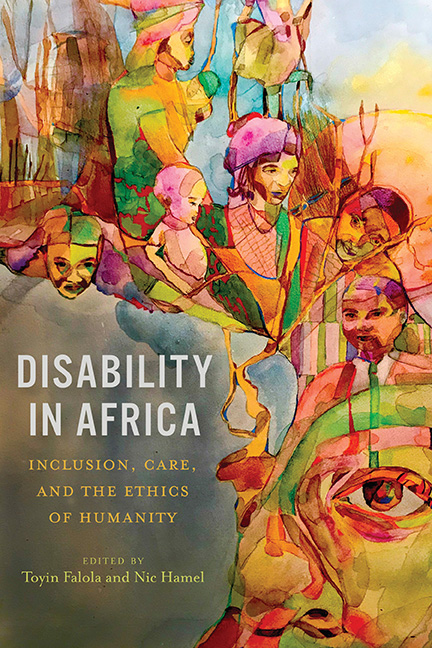Book contents
- Frontmatter
- Dedication
- Contents
- Part One Introducing the Field
- Part Two Theorizing Disability in Africa
- Part Three Representation and Cultural Expressions
- Part Four Education, Community, and Caregiving
- Part Five Activism and Barriers to Inclusion
- Conclusion: A Research Agenda for African Disability Studies
- Selected Bibliography
- Notes on Contributors
- Index
6 - Disability and Cultural Meaning Making in Africa
Published online by Cambridge University Press: 17 June 2021
- Frontmatter
- Dedication
- Contents
- Part One Introducing the Field
- Part Two Theorizing Disability in Africa
- Part Three Representation and Cultural Expressions
- Part Four Education, Community, and Caregiving
- Part Five Activism and Barriers to Inclusion
- Conclusion: A Research Agenda for African Disability Studies
- Selected Bibliography
- Notes on Contributors
- Index
Summary
Making meaning around and about disability in African contexts is a diverse, multifaceted, and often contested phenomenon. Historically, African languages rarely contained terms designating a broad category encompassing all forms of impairment. Instead, terminology reveals how communities perceived people as “without eyes” or “without ears” or when a body part was not functioning well, they were sometimes said to have “dead organs.” Physical disabilities caused by polio or limb amputation were perceived as wholly different than deafness and blindness, as were intellectual and cognitive disabilities. Meaning making, therefore, has evolved significantly with the influx and growth of rights-based approaches to disability. However, several enduring themes can be traced both in time and across the continent's space: misfortune and disruptions in kin groups; coalescing of “therapy managing groups” as an unresolved illness transmogrifies into disability; situating an anomalous body/mind in a continuum from normal to aberrant and a consequent shifting sense of identity with associated struggles over belonging. Long before the label of disability entered an African consciousness, concerns with misfortune, its cause, and accountability served as a powerful meaning-making practice for many families and lineage groups. Drums/cults of affliction were precursors to self-help groups. When a “therapy managing group” exhausted its quest for cure, a shift ensued into an identity replete with inadequacies and inabilities that often precipitated a crisis of belonging. As the pace and extent of globalization increased in the opening decade of the twenty-first century, DPOs have created alternate meaning-making opportunities and spaces. But the backdrop remains, and the themes endure, resulting in a complex hybridized set of meanings surrounding disability. So while enduring African understandings of disability have combined with rights-based meanings to create more globalized orientations toward neuro and somatic human diversity, we still find that disability connotes anomalousness, peripherality, and dependency.
“Disability questions the existence and the meaning of life,” wrote Africanist anthropologist Patrick Devlieger. It was not simply an assertion but rather embedded in a longer thought, a question, really: “If the why of disability in the African context can be understood existentially, in the sense that disability questions the existence and the meaning of life, then what does this mean in the European context?” (emphasis added) Devlieger pointed to World War II as a critical moment for disability histories because an “ideology of equal chances” began to globalize in the ensuing years.
- Type
- Chapter
- Information
- Disability in AfricaInclusion, Care, and the Ethics of Humanity, pp. 137 - 158Publisher: Boydell & BrewerPrint publication year: 2021
- 1
- Cited by

